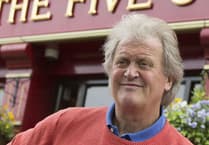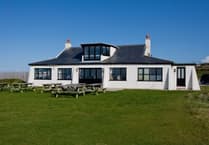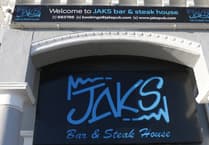A whisky distilled in Baldrine is soon going to be available to an exclusive number of connoisseurs.
The spirit has been in the making for three years – which is the amount of time it has to stand in an oak cask before can be called whisky.
It will be officially launched at Santander WorkCafe in Market Hall, Douglas, on December 14, when it can legally be called whisky.
The Manx Whisky Company is the brainchild of Magnus Grinneback and his business partner Scott Young.
‘We make whisky and that’s all we do. We decided when we set it up to make it as much from here as you really can do, using local raw materials.
‘There aren’t so many raw materials in whisky. The most important is barley, which comes from Ballavell Farm just outside Castletown.
‘We’d rather have a production standstill than use raw materials from elsewhere because ultimately if you’re making a Manx whisky you want it to be from Manx raw materials. Of course we use local water. We don’t have any magic source of water! The tap water is really good here.’
He said the third raw material was yeast but that is imported.
All the production is local.
The company is malting the barley to produce the alcohol, a process that some of the big boys in the industry often don’t do themselves any more.
‘We have decided to do everything ourselves, which is very much how distilleries used to be run in the early 1800s. We think that’s how to keep the proper local character of the whisky.
‘I love whisky. I have been a passionate whisky drinker for far too long. But also I am quite new to the island. I have been here for only five years.’
He said that when he moved to the island he was surprised that there was no native whisky, especially since the island is between Scotland and Ireland, which are major whisky producing nations.
‘It seemed there was a gap in the market. I’d spent a lot of time in e-gaming and I wanted to set something up that was not a computer-based venture.
‘I always wanted to have a brewery or a vineyard or something like that.
‘But coming here I realised the barley was good, the water was good, it’s right between Ireland and Scotland, so why not a whisky distillery?’
He said they decided to start small and concentrate only on whisky, rather than going into other spirits.
‘Even after three years, I feel like I learn new things every time I go to the distillery.’
Magnus still works part-time in e-gaming as he produces the whisky.
The fact that it takes three years before whisky can be sold means there is no income for a long time for a new whisky company.
‘You have expenses but no revenue!’
He has been going into the distillery every single day and spends at least two days there a week.
Once the whisky is produced and available for sale, they hope to sell about 1,000 bottles a year, although it will be fewer for the first year.
‘There is no plan to turn it into a massive venture. We like the fact that it’s a small, quality-driven product. Small is good. We are proud of not being a giant. There are plenty of those already.’
Of course, such a niche product won’t come cheap. It will be £78 for a half-litre bottle.
It will be cask strength, with no dilution or filtering because it’s an unmodified product.
‘It’s not cheap. It’s a whisky for whisky people, people who are really interested in whisky.’
‘You’d be surprised how many whisky nerds there are who really care about these things – myself, for example!
‘I wanted to make a produce I’d like to buy myself.’
He said that rather than trying to compete with large Scottish brands, the company had to do something different.
‘That’s what we’re trying to do by keeping it local, by using production methods that are really old-fashioned and which have been largely abandoned because of cost-cutting.
‘I think there is a great demand for that type of whisky.’
The unpeated whisky will be sold on the company’s own website.
For the first launch, the demand will be higher than the number of bottles available, Marcus believes. So the company will run a ballot where people will sign up in a kind of lottery.
Magnus, who’s 47, came to the island with his wife to work for Mayfly Entertainment originally.
He is Swedish and he and his wife lived in Malaysia before they moved to the Isle of Man.
‘The Isle of Man is a great place to live. My wife Panida is from New Zealand and we always joke this is a little bit like New Zealand was 30 years ago. There are a lot of similarities. It’s a great lifestyle.’
December 14’s launch night might be disappointing for some.
All the tasting tickets have already sold out.
But anyone can go along to see a presentation to learn more about the product.




